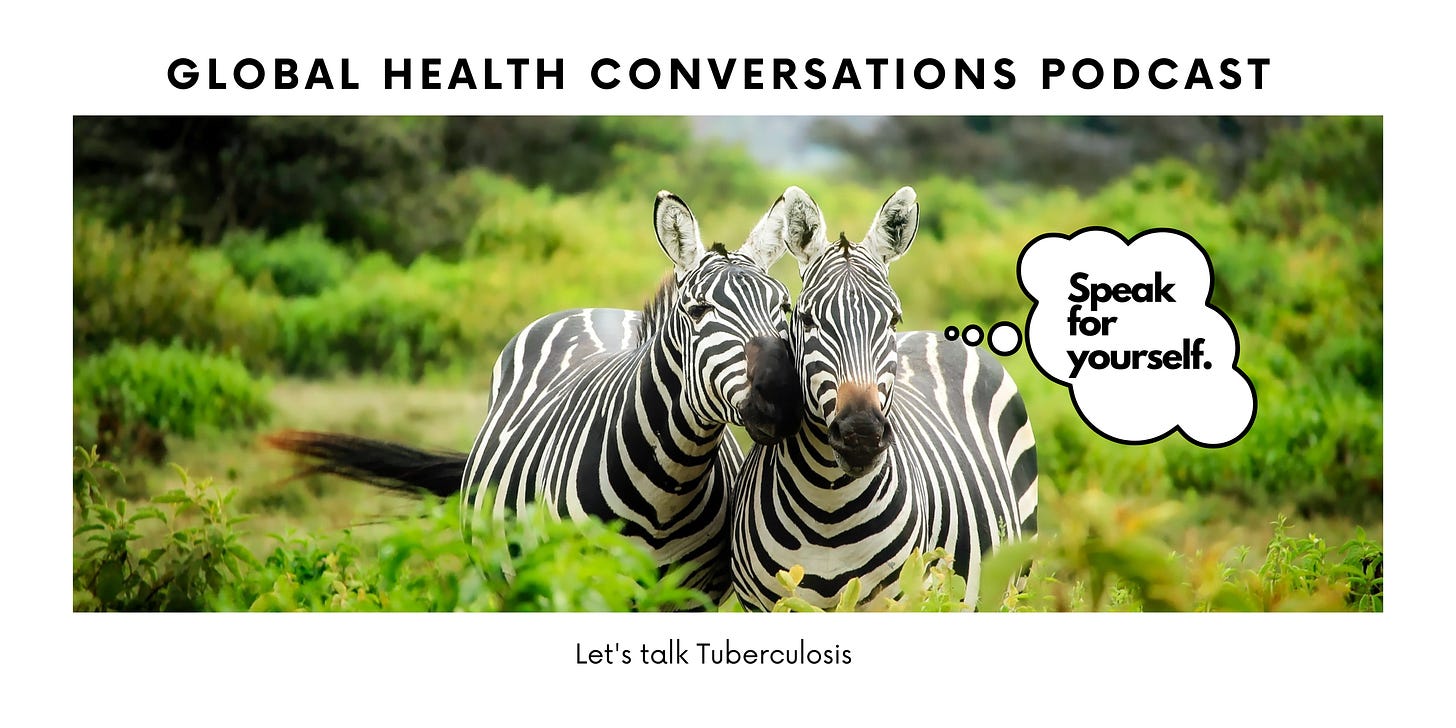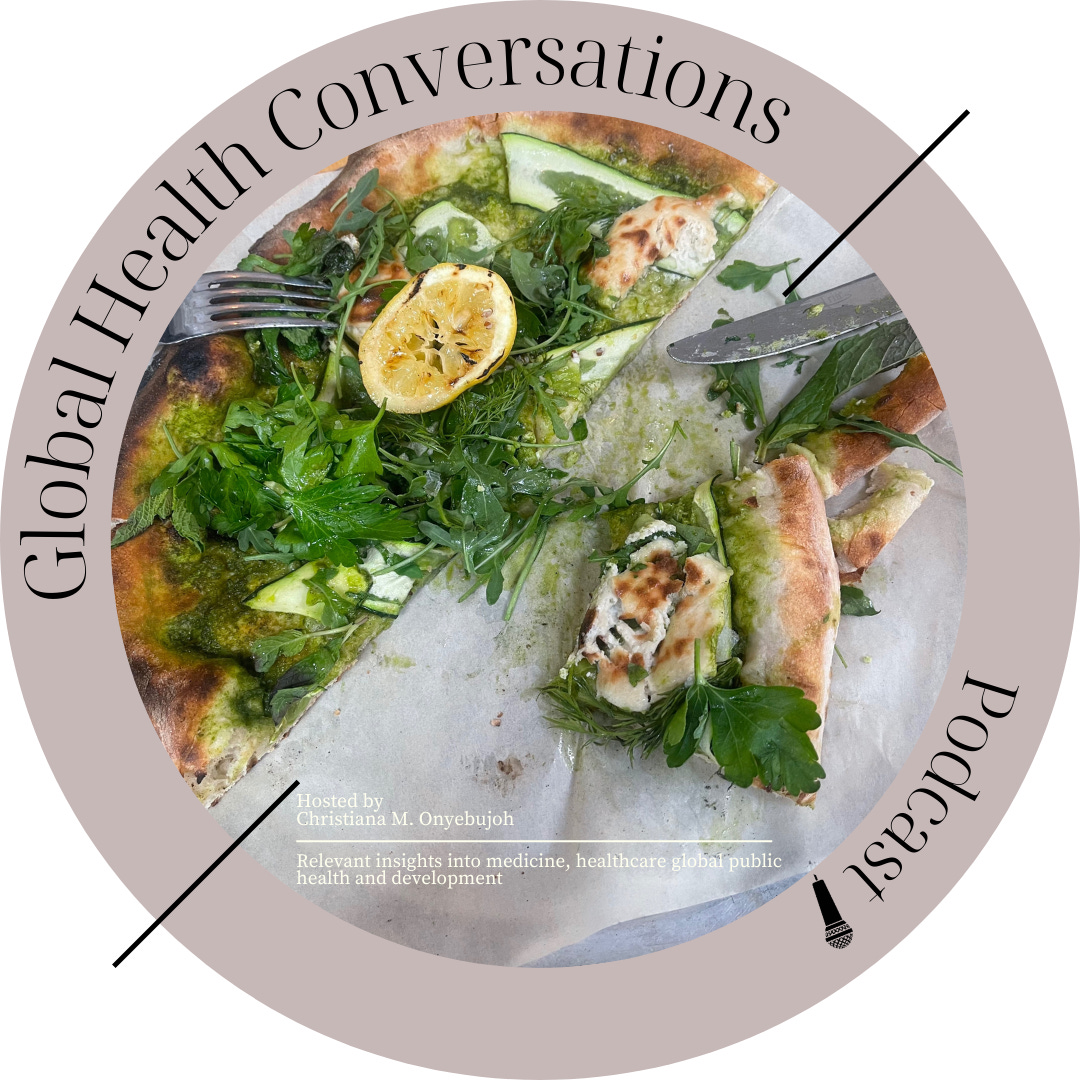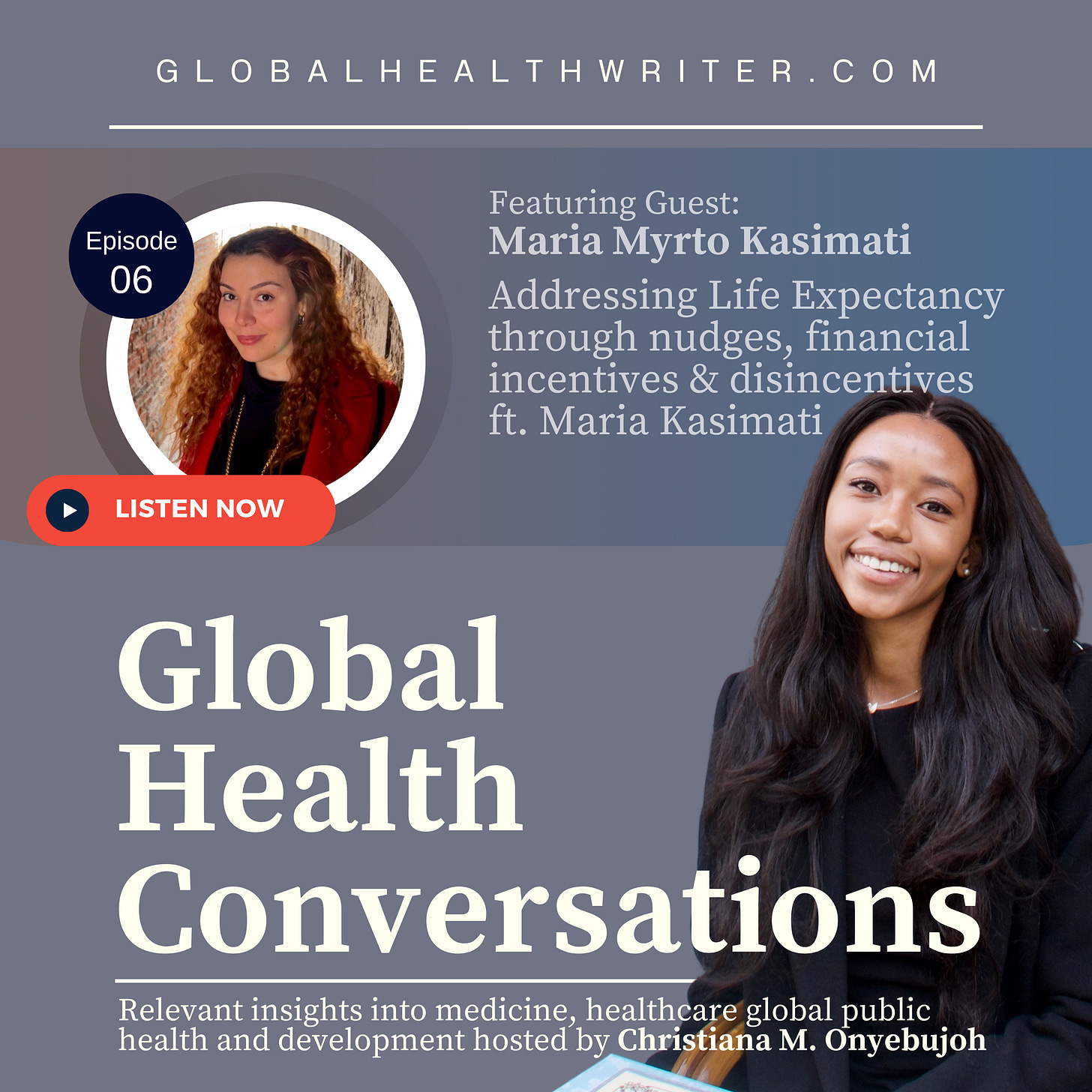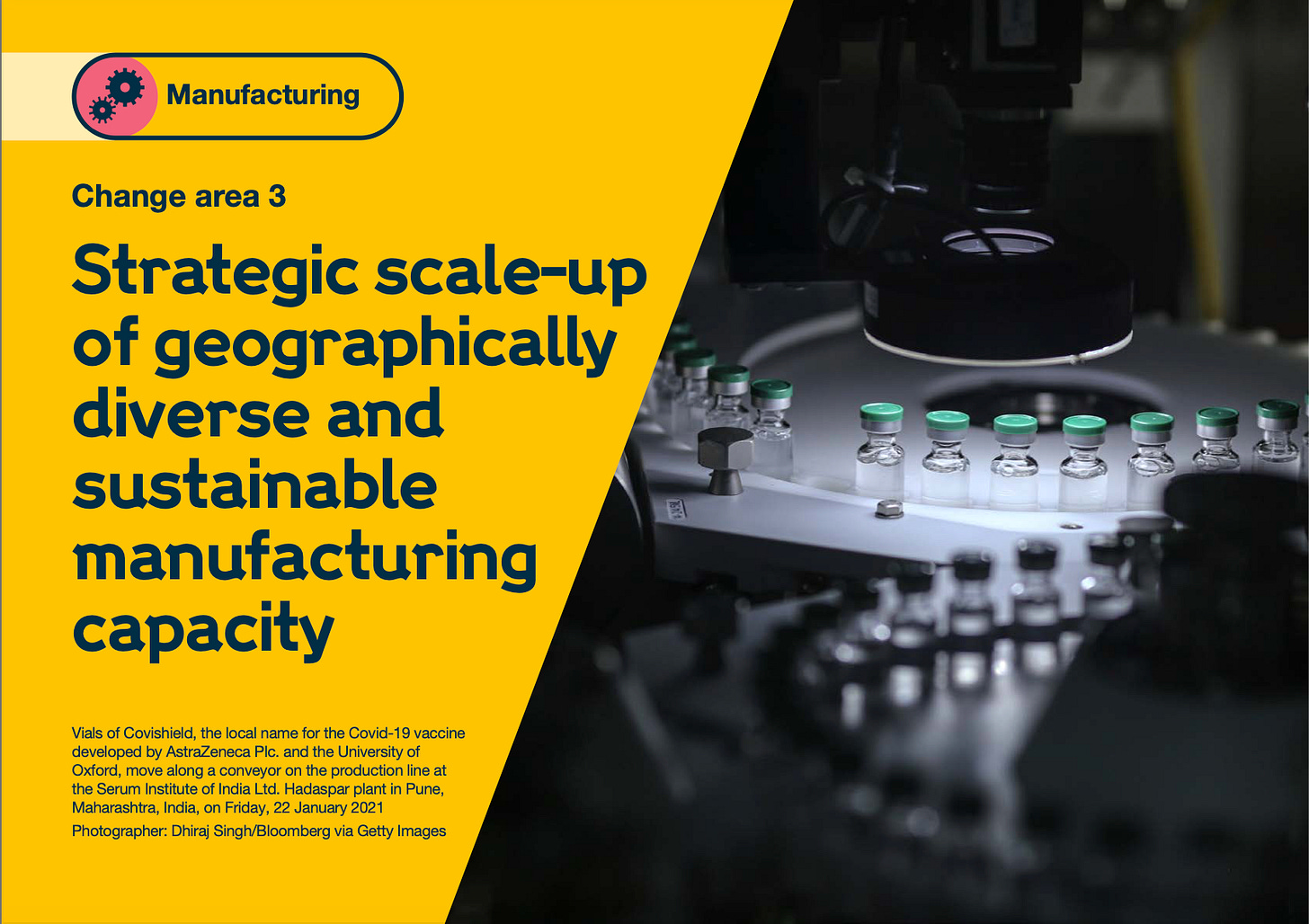Breakthrough in Drug Patents for MDR Tuberculosis & your fortnight in resources
And a little surprise incoming later this week (but not in your inbox!) ...
Dear Friend of Global Health Conversations,
Are you in the middle of your Sunday night email check-in? Then I have the best diversion for you.
Something huge happened since we last spoke! It sparked the interest of international news. It’s tuberculosis. And Johnson & Johnson. We are finally having a mainstream and multisectoral discourse across the private and public sectors about one of the world’s leading causes of death. Read more about it below.
We have social media warriors (for good) and one of the world’s leading pharmaceutical companies pledging not to enforce patents on a recently extended compound for the treatment of multi-drug-resistant Tuberculosis.
In the meantime - and on the topic of life expectancy - this week’s episode is out! It’s a discussion and an unofficial Part 2 to episode 2 with my dear friend, Mary Kasimati. It’s a great and nuanced discussion and perhaps one to take on your commute!
Musings. I have been thinking more about the precedents and various issues around drug patents, patent extensions (you might recall I once wrote an informal ‘Insider’s guide to making your drug last forever $$$’. Very tongue in cheek) On the original blog. I’m no longer writing regular blog posts, But I plan to revamp the blog soon.
I had a wonderful fortnight. I had escargot in the park on a beautiful summer eve with my BFF (see below ;)) and dropped into Montreux Jazz Fest on another. It has been a month since I had a chance to say a prayer at the historic John Wesley’s House in London’s Shoreditch, and visited Hammersmith pier for some fish and chips with another dear friend. Moreover, I have started drawing again. I bought myself some watercolour pencils and I feel like I have been transported to my high school days hiding in the art department and getting lost in colour. With too much excitement to fit into the postcard - I have enclosed an image of a shockingly yummy vegan sourdough pizza (sadly, if you know, you know) that I had somewhere in Venice Beach 04/2023. And I feel simultaneously peckish and also privileged that you’re reading this. I’m ecstatic about this hobby and the opportunity to pursue it.
FINALLY - I have a surprise for you. In the coming days an exciting bonus episode will drop on Global Health Conversations. There won’t be an additional newsletter. But, Clue: I think ‘true crime’ lovers will enjoy the Friday drop. ;) If you haven’t already subscribed to the podcast on Spotify or on Apple Podcasts - this is a great time to do it. You’ll be informed when the new episode is out. ;)
Until next fortnight.
With love,
Christiana
Bulletin board:
(Basically - your LinkedIn page but better curated 😉)
Unlocking the potential of AI in Drug Discovery - Current status, barriers and future opportunities - Wellcome Trust have published a fantastic paper on the developments of AI in Drug Discovery. This one is not to be missed.
WHO is preparing for potential increased spread of viral diseases like dengue, Zika and chikungunya linked to El Nino - El Nino, a warming of water surface temperatures in the eastern and central Pacific Ocean, has returned after three years of the La Nina climate pattern.
CRISPR Gene-editing technology offers the promise of cures for sickle cell disease - Who will have access to these therapies? This article addresses this.
Voluntary licensing of long-acting HIV prevention and treatment regimens - promoting quality-assurance and affordability in LMICs - This paper published, largely by the Medicines Patent Pool, in the Journal of the International Aids Society is a must read.
(If I missed any important headlines and you’d like to see them here; feel free to forward them to me in response to this email. :))
Johnson & Johnson and the Bedaquiline Story - Tuberculosis Advocates Secure Victory as Cheaper Generics Agreement Reached (so far!)
A story only rivalled by Martin Shkreli (a.k.a. Pharma bro’s) 2017 Daraprim scandal and the Forbes 30 under 30 to prison pipeline. 👀
Tuberculosis (TB) continues to be a significant global health concern, with approximately 1.5 million deaths reported annually. Among the most challenging aspects of TB treatment are multidrug-resistant tuberculosis (MDR-TB) and extensively drug-resistant TB (XDR-TB), both of which require specialized medications and treatment plans. However, producing effective treatments for these drug-resistant forms of TB has been hampered by a lack of investment in this area of drug development due to the perception that the market is not profitable enough for pharmaceutical companies.
The story started as internet activists, including John Green, author and YouTuber on the Vlog Brothers channel (that I realised I have personally been subscribed to for probably almost 15 years!) along with their army of Nerd Fighters decided to take a stand and amplify the work of activists, mostly female, in the global south and abroad. He released a video announcing that finally, Bedaquiline, the first drug in decades for TB that has been shown to be highly effective against multi-drug-resistant Tuberculosis (MDR TB) was finally set to come off patent on 18 July 2023. A milestone that activists world over had been waiting for. This meant that generics manufacturers world over could begin to produce the drug (branded Sirturo) and thus significantly reduce the cost of the treatment making it accessible to patients the world over. TB is the world’s deadliest infectious disease. Drug resistant TB strains are increasingly hard to treat and investment in R&D in this area has been remarkably low since the 1960s. This mirrors the pattern in the development of antimicrobials over the past decades. Particularly those annexed for use primarily in low- and middle-income countries. At the heart of this is the injustice of 1.2 million people annually succumbing to a disease that is curable. Because of a lack of access.
Generics would bring down the price of bedaquiline to a level that is estimated to increase access to approximately 6 million people.
And then, internet activists learned that Johnson & Johnson who hold the patent to this compound (distributed by their company Janssen) intended to extend the patent through pursuing a secondary patent via a minor incremental improvement in the formulation of the drug. Which is standard practice in the industry. The nerd fighters and other activists argued that this amounted to patent evergreening and is essentially, if nothing else, against J&J’s credo. You have to watch the video.
“But the time has come for this drug funded primarily by the public to be returned to the public as a public good.” - John Green
This issue is thought with controversy. Probably more than any of the other controversial topics I have discussed in this biweekly forum that we share. I plan to make an episode about this soon as part of the UHC series in September. I am conscious of the fact that I consider myself a public health advocate. Nevertheless, I am a public health advocate who comes largely from the pharmaceuticals space and as such I feel I would be remiss not to talk about it.
The recent victory in the fight against TB comes in the form of an agreement announced by the UN-affiliated STOP TB here in Geneva, from whence I write. The agreement aims to make cheaper generic versions of the lifesaving TB drug, bedaquiline, available in numerous low- and middle-income countries that face high TB infection rates. Bedaquiline, approved in 2012, marked the first new TB drug in over four decades and significantly improved treatment for drug-resistant TB. However, its initial high cost limited access in countries hit hardest by the disease, primarily affecting the world's poorest populations. Despite the company gradually reducing the price, bedaquiline has remained inaccessible to many in need.
The difficulty in providing affordable TB treatments is partially rooted in the way drug patents work. Patents grant exclusive rights to a pharmaceutical company to manufacture and sell a drug for a specified period, typically 20 years, 14 years, etc. During this time, the company has a monopoly on the drug, allowing them to set higher prices. To extend this monopoly beyond the initial patent expiration, some pharmaceutical companies employ to methods like reformulation, changes in administration mode or other use licensing to allow them to cover their costs and gain a healthier return for their investors, etc. This practice involves obtaining additional patents for modifications to the drug, even if these modifications may in some cases be minor and thus do not significantly improve its effectiveness. By doing so, companies can maintain their monopolies on distribution and production. Limiting competition from generic drug manufacturers for a longer time frame.
Reformulation is one of the methods used by pharmaceutical companies to increase the length of drug patents. By slightly modifying the drug's composition or delivery method, companies can apply for new patents for the updated version, thereby extending their exclusivity on the market. However, such practices have been met with criticism, particularly in cases where drug development received significant public funding. Critics argue that taxpayers' money contributed substantially to the drug's development, making it unfair for companies to maintain exclusive control and charge high prices.
The TRIPS (Trade-Related Aspects of Intellectual Property Rights) agreement, established by the World Trade Organization (WTO), sets international standards for intellectual property rights, including pharmaceutical patents. During the COVID-19 pandemic, the TRIPS waiver became a subject of controversy as some countries sought to suspend certain patent rights temporarily to enable wider access to COVID-19 vaccines and treatments. This move faced opposition from some pharmaceutical companies and countries that argued it could hinder innovation and discourage future investments in drug development.
In the case of bedaquiline, Johnson & Johnson (J&J) held a secondary patent expiring in 2027, allowing them to optimize the drug's original molecule for therapeutic use. Activists feared that enforcing this patent would hinder the arrival of cheaper generics in countries with a high prevalence of drug-resistant TB. The pressure campaign, fueled by novelist and YouTuber John Green, due to his large platform, prompted a collaboration between J&J and STOP TB's global drug facility. As a result, a new deal was reached, expanding access to generic versions of bedaquiline in low- and middle-income countries.
While the agreement represents progress in the fight against TB, advocates stress that more needs to be done to remove barriers and widen access to affordable treatments. They call on pharmaceutical companies to commit not to enforce patents that hinder accessibility and emphasize the importance of public outcry to push for positive changes in global health. As the battle against TB continues, the need for affordable and effective treatments remains a top priority to save millions of lives affected by this deadly disease.
It is important to note that J&J still hold their patent until 2027 but have committed not to enforce it in certain regions, some of which form the hardest hit regions by MDR TB.
OUT NOW: This week’s episode 🤩🤩
Episode 6: Addressing Life Expectancy through Nudges, Financial incentives & Disincentives (ft. Maria Kasimati)
This week we discussed nudges, financial incentives, financial disincentives and more health economics and policy approaches to improving outcomes and addressing life expectancy. Looking at the concept of adequate life expectancy as a human right.
Coming Soon:
The Fortnight in Resources:
(In other news - I signed up to a wildly overpriced Medical and Pharma industry newsletter so you don’t have to ;) Hopefully my resources, insights and ‘hot takes’ will continue to provide value :) )
Wellcome: A discussion paper - Towards a Reformed R&D Ecosystem for Infectious disease - “While governments spent ≈ $90bil USD on Covid-19 vaccine R&D in the first 11 months od the pandemic, this is more than 80x the $1.1bil USD spent on TB vaccine research in the last 11 years.” We’re talking R&D progress in the global south, pandemic preparedness and response, issues around scale-up and more.
Hard hitting interview on Monkeypox - Infectious disease, public health, R&D, surveillance, equity and access across the globe - The mechanisms around disease response has always been political. Since HIV in the 1980s; SARS-CoV-2 in the early 2020s as well as monkeypox. How can we create market appropriate systems to ensure access for all patients, worldwide? Responding to disease everywhere. This discussion touches on many important subjects including local manufacturing of vaccines and biologics.
Diagnostic accuracy of computer-aided detection systems for detecting pulmonary tuberculosis on chest radiography for screening: International migrants screening study - FIND Geneva office collaborated with the IOM and others on this unique study evaluating the accuracy of AI and Computer Aided Detection (CAD) systems for the diagnosis of Tuberculosis. At the centre: the health of all migrants, globally.
Resources from this week’s podcast:
Nudges Versus Financial Incentives (abstract) (2023)
World Bank - Life Expectancy at Birth (years) (up to 2021)
Key Data on Health and Health Care by Race and Ethnicity (2023)
Behind the scenes:
Coming in season 2 - Leena Ghalib on the podcast talking about health inequities, malaria and her work at UNOPS and RBM. For now, here’s one from my scrapbook. A picture from last week Saturday.
Recent Episodes: In case you missed them! 💃🏾
Episodes on GHC come out once a fortnight on Sundays!
Episode 1: Universal Health Coverage: No-one Left Behind & Financial Protection
Imagine a world where quality healthcare is accessible to all individuals and communities, without the burden of financial hardship. At the heart of UHC lies the idea of providing comprehensive health services to everyone: leaving no one behind.
Episode 2: How to Write Your Way to Success: Navigating Career Paths, Marketing in Healthcare & Life’s Unexpected Twists (ft. Maria Kasimati)
We discuss career paths, healthcare access and medical writing. Have you wondered how to harness your scientific background into science-driven education and medical writing?
Episode 3: Let’s Talk Obesity in the UK - Causes and Consequences
In this solocast episode, we explore the causes and consequences of the rise in obesity incidence in the United Kingdom.
Episode 4: Revolutionizing Global Health with AI: Exploring Novel Approaches for Enhanced Health Outcomes
Imagine a world in which public health policies were shaped by powerful insights derived from cutting-edge technologies like AI, Machine Learning, and Big Data models. We’ve officially arrived. In this episode, we delve into the transformative potential of predictive and prescriptive analytics, shedding light on how these techniques can revolutionize the way we approach public health challenges.
Episode 5: CRISPR, Gene Editing, Access to Biotherapeutics & On-target approaches to the PhD journey (ft. Margareta Rybarikova)
Margareta Rybarikova is a current PhD candidate with a keen interest in the development of novel therapies for genetic disorders. A friend of the podcast, Margareta discusses her research, gene therapies as a frontier in tackling rare diseases, access to biotherapeutics and balancing life and science and scientific career paths.
Thanks for being part of the Conversation.
Best,
Christiana










